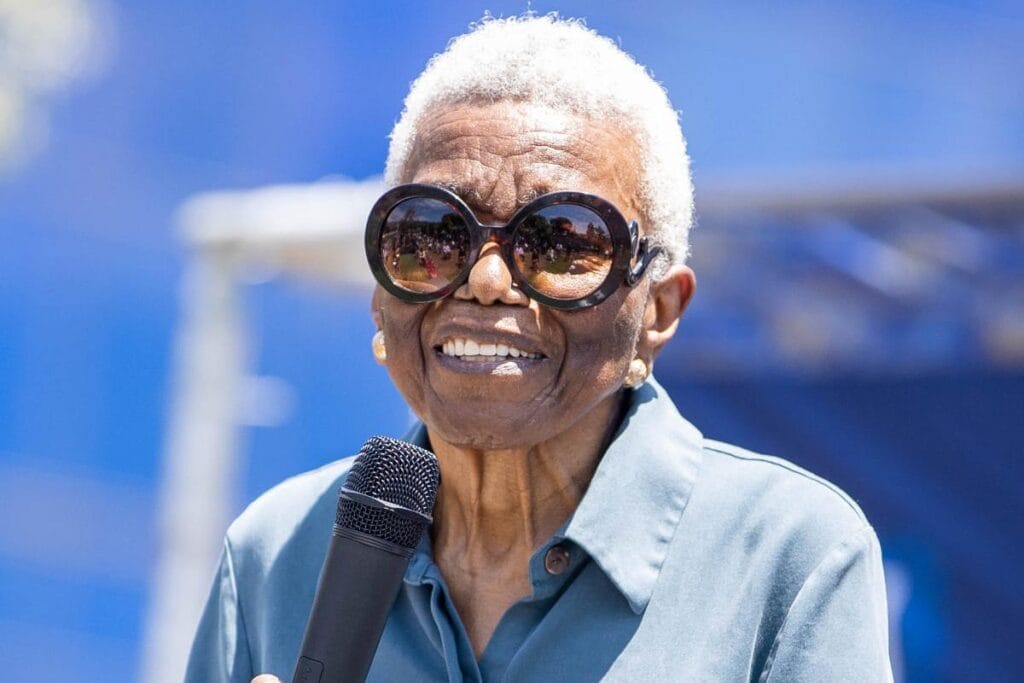Jewel Thais‑Williams, affectionately known as “Mama Jewel,” passed away on July 7, 2025, at age 86, as confirmed by her sister, Carol Williams. Born in Indiana on May 9, 1939, and raised in San Diego before settling in Los Angeles, she would go on to become a pioneering voice for Black queer liberation, especially as a Black lesbian creating space for others in a hostile time.
Creating a Sanctuary: Jewel’s Catch One
In 1973, frustrated by racism and sexism in existing gay bars, Thais‑Williams purchased a former ballroom on Pico Boulevard and turned it into the landmark nightclub Jewel’s Catch One—becoming the first Black lesbian in the United States to own a queer nightclub. The club quickly became a vital space for Black queer women, trans folks, LGBTQ people of color, and allies. It hosted legendary performers—from Donna Summer and Chaka Khan to Madonna and Whitney Houston, and became known as the “Studio 54 of the West,” all while insisting on radical inclusion and community affirmation.
Jewel described it simply: “It was a community, it was family.” She created a home for people rejected by mainstream gay life and facing constant policing and surveillance—a place where Black queer individuals could dance, express themselves, and belong without fear. Carol Williams, her sister, called Jewel “one of the most brilliant individuals I’ve ever met” and a beacon of self‑acceptance for generations who felt “different from the norm.”
LGBTQ and AIDS Activism: Building Networks of Care
As the AIDS crisis decimated queer communities in the 1980s, especially Black and Brown gay men and transgender people, Jewel turned Catch One into more than a space for nightlife—it became a hub of activism and healing. She co‑founded the Minority AIDS Project in 1987 to connect vulnerable communities to education, testing, and resources, and joined the board of AIDS Project Los Angeles to help bring healthcare “down to the hood.”
With her life partner of over four decades, Rue Thais‑Williams, she established Rue’s House in 1989, the first housing facility in the U.S. dedicated to Black women living with HIV and their children, many of whom had been ostracized by families and communities. When effective HIV medications arrived by the mid‑1990s, Rue’s House transitioned into sober‑living support, reflecting Jewel’s evolving vision of long‑term care and inclusion.
In 2001, she founded the Village Health Foundation, using her background in holistic medicine—she’d earned a Master of Science in Oriental Medicine in 1998—to provide culturally competent, affordable health care, nutrition education, and chronic disease interventions to low‑income and Black communities in Los Angeles.
Identity, Representation, and Black Lesbian Leadership
As a Black lesbian, Jewel embodied the intersectional challenges of sexism, racism, homophobia, and classism. Under California law at the time, women, especially queer women, were legally barred from tending bar unless they owned the venue. She navigated and disrupted these barriers, openly embracing her identity even when her father remained unaccepting, and her early years were marked by the fear of coming out.
In the broader gay movement of the 1970s and beyond, female and Black voices were often sidelined. Jewel refused to be invisible. She created a space where Black lesbians, trans people, and queer people of color could flourish. She was unapologetically intentional about inclusion: “I got the first sense of the business being more than just a bar … when Black gays were carded… to get into white clubs,” she recalled in 1992—so she made sure Catch One welcomed everyone without permission or policing.
Legacy and Commemoration
Under her leadership for 42 years, Jewel’s Catch One endured police harassment, a fire in 1985, and the changing LGBTQ nightlife landscape, and became the longest-running Black queer nightclub in Los Angeles, until she sold it in 2015 (it reverted to its original name, Catch One, soon after). As she put it, she wanted the economic institution to remain in Black hands and serve its community in perpetuity.
Her impact continued long after the club closed. She was Grand Marshal of the 2016 L.A. Pride Parade, selected for her enduring role in queer liberation. In 2019, the intersection of Pico Boulevard and Norton Aven, outside the former Catch One, was officially dedicated as Jewel Thais‑Williams Square by the L.A. City Council, marking one of only a few LGBTQ‑historic monuments in the city.
Her story was immortalized in the 2016 documentary Jewel’s Catch One, directed by C. Fitz and distributed by Ava DuVernay’s ARRAY, which traced her journey building not just a club but a sanctuary and social movement. Activists like Rep. Maxine Waters called her “a warrior… she just did it—over and over again” and Keith Boykin said the most important lesson he took from her was that “building community in a time of oppression is an act of resistance.”
A Legacy of Love, Safety, and Black Queer Joy
Jewel Thais‑Williams’s legacy endures in every corner of Black LGBTQ+ activism , from safe nightlife to housing, from holistic health care to coalition building. As Jasmyne Cannick said: “Long before Pride had corporate sponsors and hashtags, Jewel was out here creating space for us to gather, dance, organize, heal, and simply exist.”
She leaves behind her partner, Rue, and siblings Carol Williams, Lula Washington, and Kenneth Williams, along with a multigenerational community she lovingly nurtured. In the words of NBJC Executive Director Dr. David J. Johns: she was “a guiding force … the matriarch of a movement that has always depended on our ability to dance, love, and survive.”
Jewel’s life reminds us that creating safety and joy is more than necessary and spaces like these for queer women need to be brought back as we continue to progress. She showed how building bridges and opened doors could be possible. And she offered care and demanded visibility, and changed the world.













